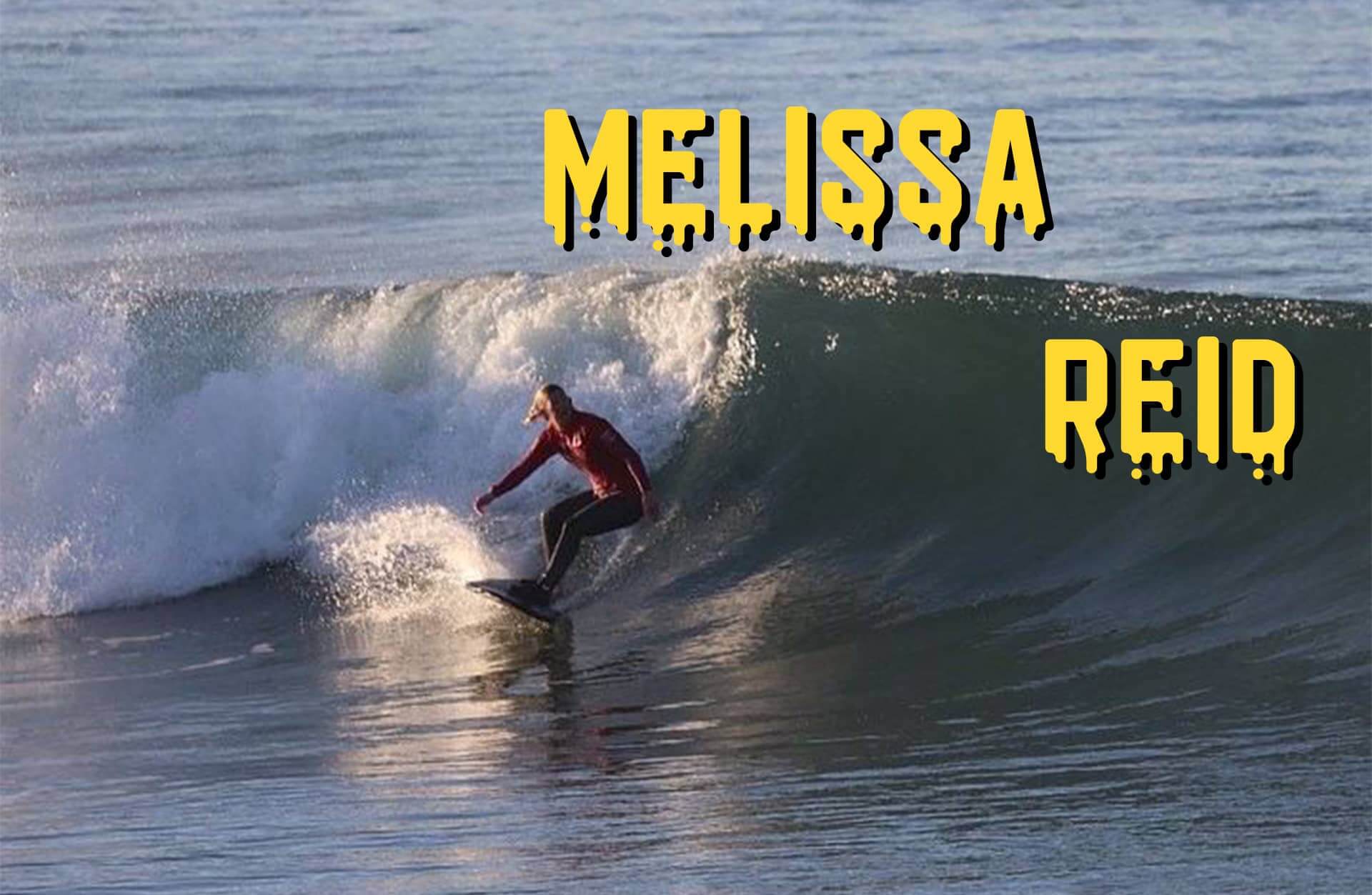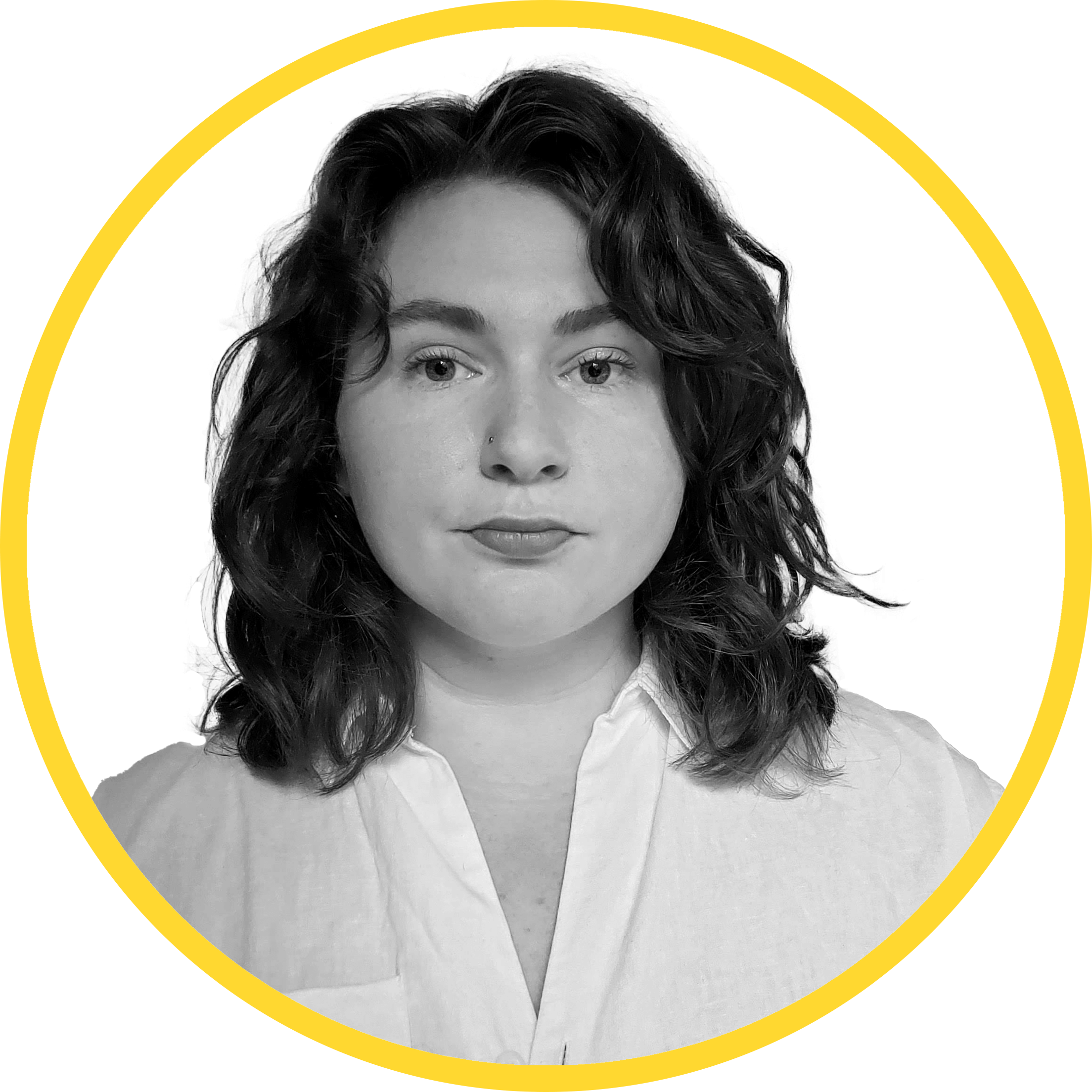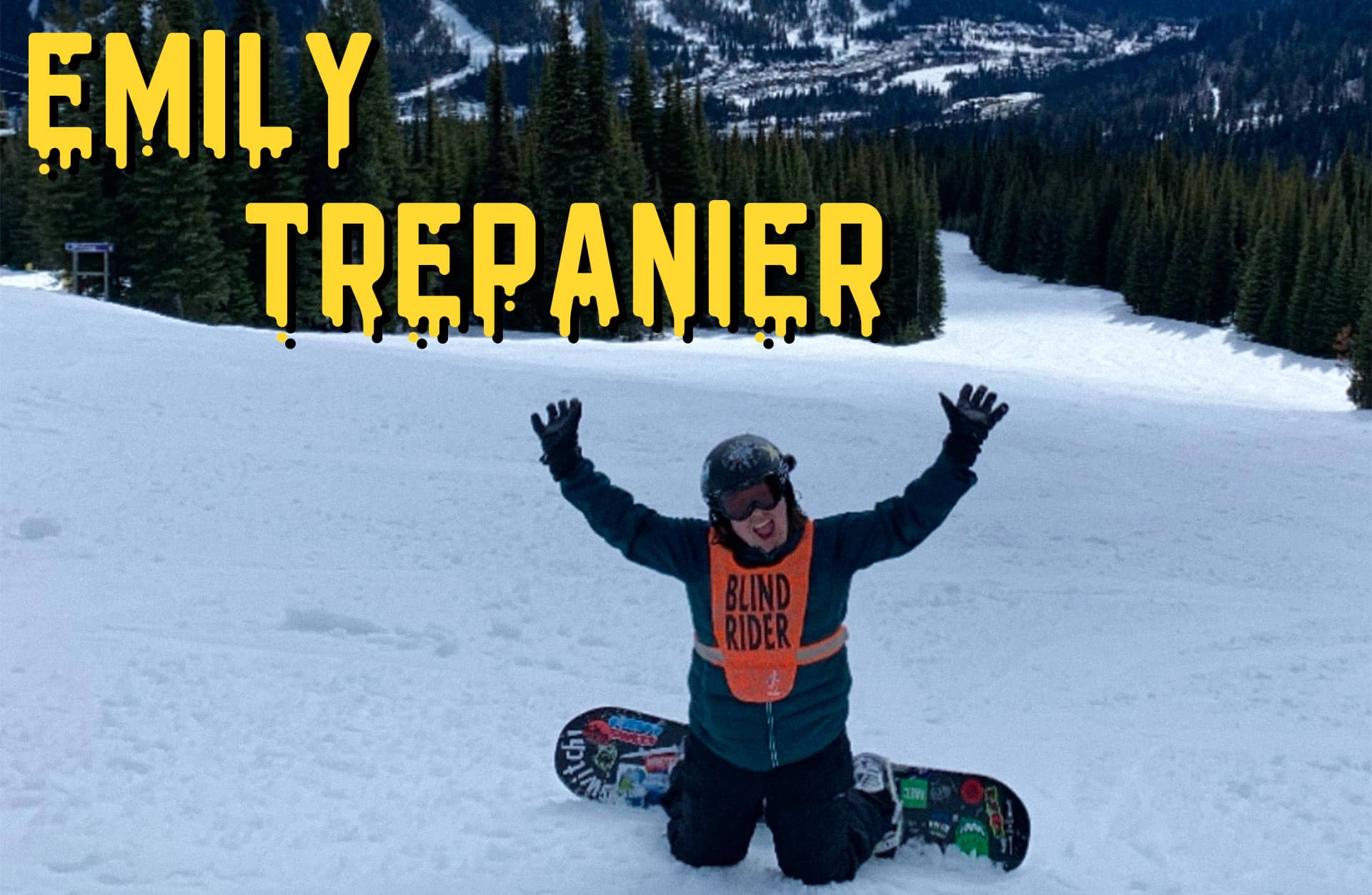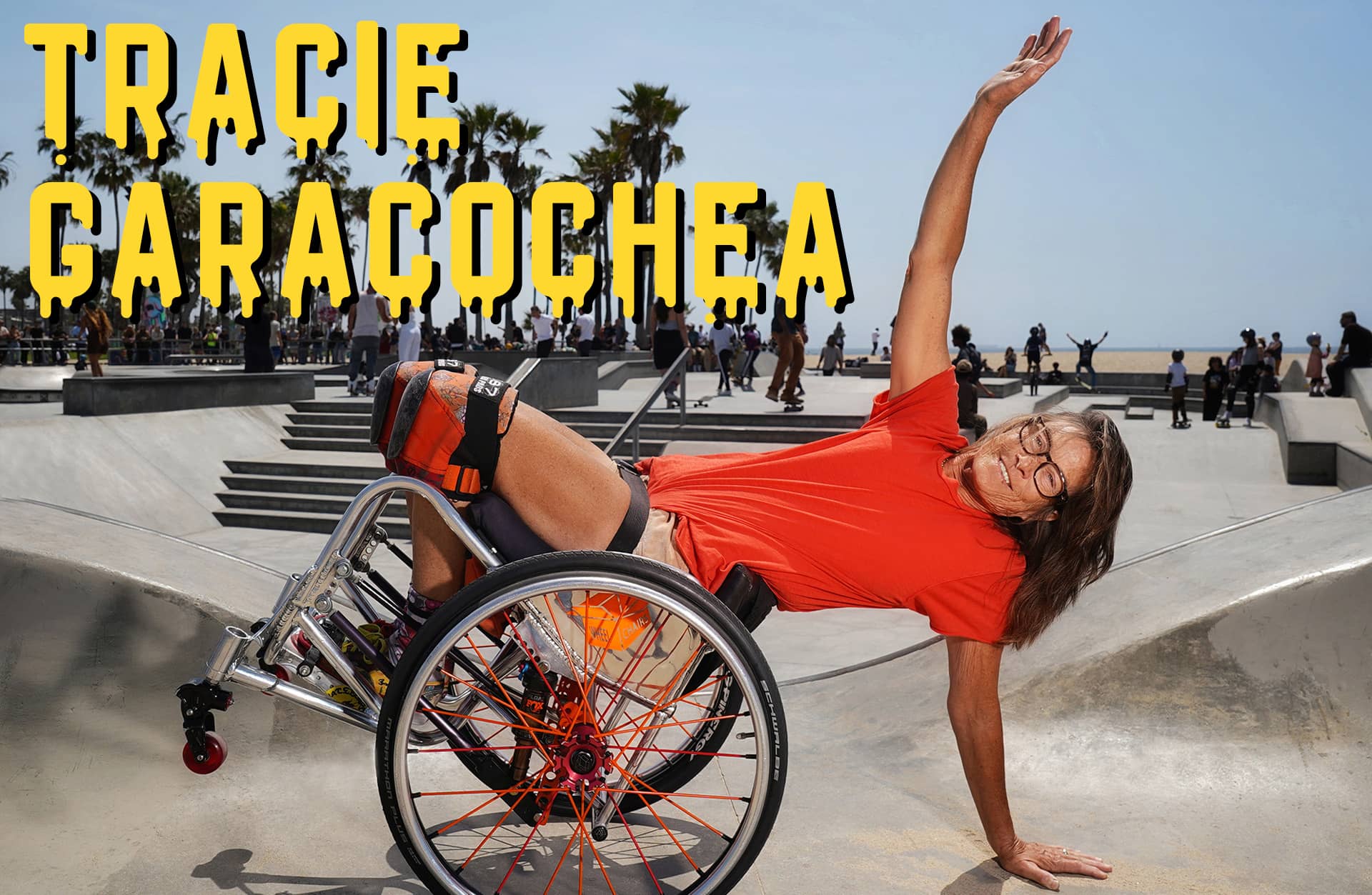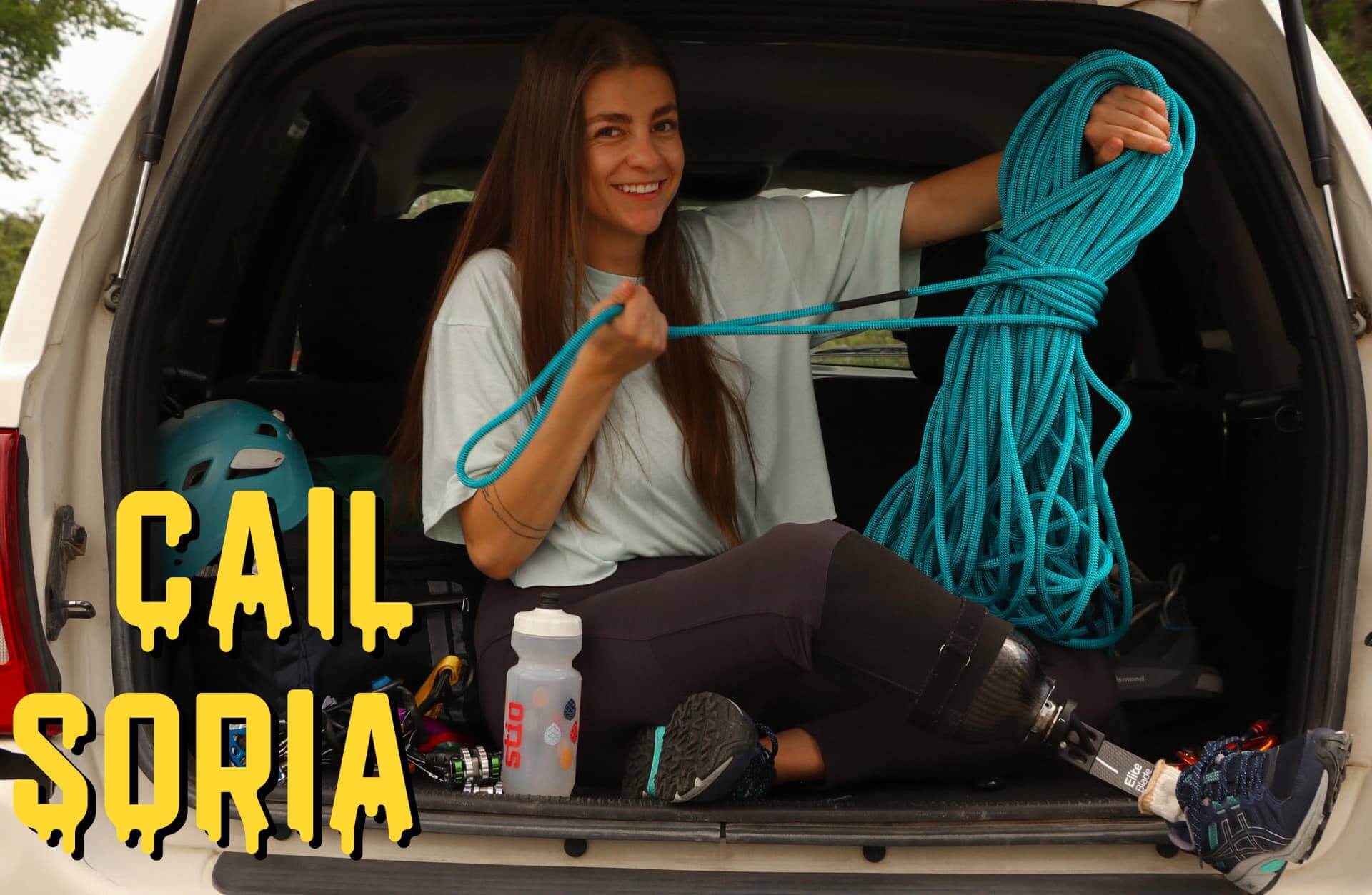SURF // 01 MAR 2024
THE SIGHTLESS SURFER
As a child, the Paralympic bronze medalist in triathlon and 3x world champion in surfing, Melissa Reid, did not like sports. “I was awful at sports. I was pretty rubbish at most things,” she laughed. “Ball sports all involve hand-eye coordination. So at school, I hated everything.” The reason being, while Reid and her parents were aware of her visual impairment, none of them knew just how much she couldn’t see. With no vision out of her right eye, and a pin-hole of vision from her left, it is understandable that Reid found sports and school, as a whole, frustrating.
“I genuinely believed that I was fine,” she explained. “In school they’d brought in people [to help] but no one asked me what I wanted, they told me what I was going to have. I remember someone coming in from some blind charity to give me a white stick. I was like, if you give me that, I will stick it up your ass and you’ll waddle out of the room with it.”
Reflecting back, Reid may have chosen her words a little differently, but as a kid it was the only way she knew how to stand her ground. While some activities may have been challenging, Reid had no interest in others telling her what she could or couldn’t do. And at eight, she finally found a sport she did enjoy. A place where she felt like she was finally on the same playing field: surfing. “Once I was on the wave,” she said. “I was pretty much the same as everyone else.”
That freedom drew young Reid to competitive surfing. Well, that and the goodie bags. “I’m not going to lie,” grinned Reid. “Growing up, the kid’s goodie bags were pretty great.”
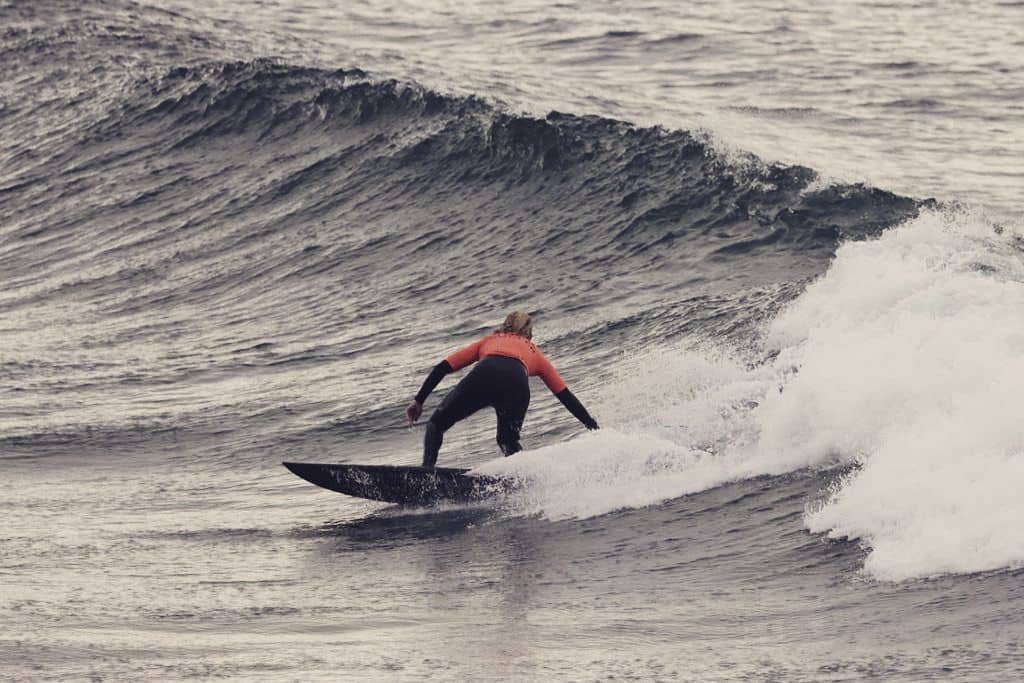
During these competitions, there was no guide in the water with Reid. And while catching waves was no issue for her, knowing when to start was a different story. “In the U.K., it’s never a nice, perfect offshore wind with perfect waves,” she explained. “[Out in the water], you couldn’t hear the hooter when to start, so there was a little green or red board on the beach, and well, I couldn’t see that.”
Occasionally, Reid’s father would attempt to give a signal from shore. But in general, Reid enjoyed her time competing as a way to hang out with friends in a less busy line up.
Biking to college. Surfing with friends. Reid continued to live with zero aids, except her determination. Or perhaps it was stubbornness. Nonetheless, driven by the idea that, if everyone else can do this, I should be able to as well, she dealt with the occasional frustrations and just lived. And she might have gone on this way indefinitely, if it wasn’t for driving.
Butter Mag is a 100% reader supported publication. By subscribing to Butter’s Patreon for as little as 2$/month, you keep Butter churning, so that together we can create a more diverse outdoor sports community.
“My dad was like, ‘you want to drive? We’ll drive.’ [Then] he did the blindspot test and he went, ‘fuck, you can’t see’,” recalled Reid. “I was like ‘well, [my vision] hasn’t changed in the past 30 seconds.’”
Driving it turned out would be just one of the many obstacles Reid would face as she entered adulthood. One of the more pressing being, without a driver’s license, she wasn’t eligible for most jobs where she lived. Realizing the extent of her struggles, Reid’s dad made a suggestion. “He was training for an iron man, so he made me train with him to get rid of some anger and tension,” said Reid. “Then [one day] I saw there was an event in London for para triathletes. I rocked up with someone that I’d trained with for two hours, and we came second at the world series.”
She smiled, “That’s when my triathlon career kicked off.”
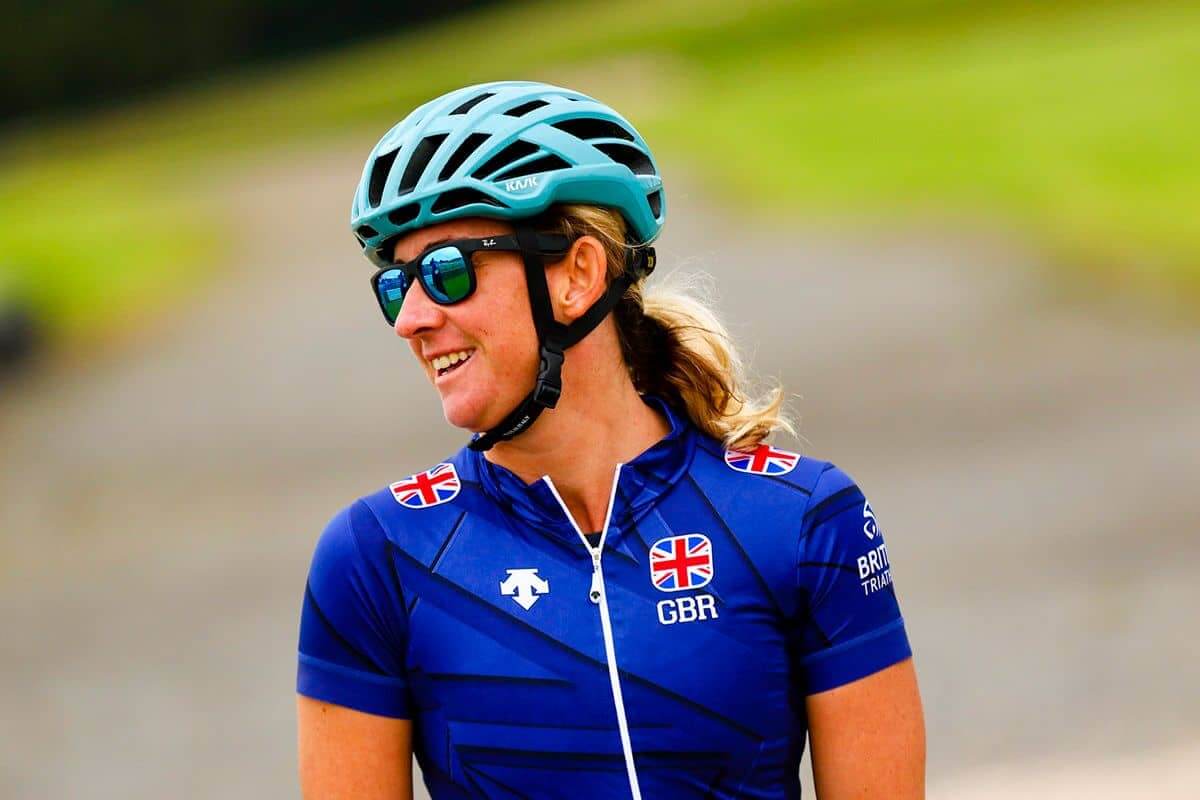
All that swimming for surfing and biking during college had paid off. For Reid, it felt good to both have a job and be damn good at it. Nowhere was her ability more apparent than when she took third place at the Rio Paralympics.
“That sprint finish for third was probably one of the most emotional points I’ve ever had in a competition in my entire life,” said Reid. “I didn’t even know I’d gotten bronze. I collapsed on the finish line until we were shuttled away and they were like, ‘you need to put your podium kit on.’ I was like, ‘what the hell?’”
Though triathlons weren’t necessarily Reid’s passion, she enjoyed competing and achieving. As far as jobs went, she was pretty satisfied. That is, until her injury. “If you want to use an analogy most people will understand, it’s like being Wheezy out of Toy Story. You’re just put up on a shelf and left to rot,” said Reid.
The injury came with no warning. Reid recalled, “I put my shoe on and just fell over. I face planted onto the floor in excruciating pain. I could barely walk.”
While visiting doctors to find the source of her pain, Reid continued to race in agony. Her answer was revealed with an MRI scan which determined she had a prolapsed disk in her spine. For the Paratriathlon governing body, the path forward was clear. Reid simply needed to do some core exercises to stabilize her back. “I had the best six pack I’ve ever had in my entire life,” said Reid. “But ten minutes on a bike and I couldn’t feel my legs.”
“I went in for a second opinion. They said I needed to stop training immediately, because if it ruptured I’d be paralyzed. I was like, ‘mate, I’m already blind. Being blind in a wheelchair is not my idea of a good look. [The doctor] said, ‘ideally, you need surgery, but you’re an athlete, so there’s no one in the UK that’s going to touch you. Your second option is to retire.’”
“I was like, ‘yeah, okay. Third option?’”
Reid and her doctor settled on using a concoction of steroids to relieve the pressure from her spinal cord. Though the private care provided through the governing body was hesitant to approve the procedure until Reid told them, “[I’m going to] pay for it myself [if you don’t] because I literally cannot function in my day-to-day life right now, never mind competing.”
Unfortunately Reid’s back gave out a little over a month before the Tokyo Paralympics. So even with a quick turn around on the procedure, Reid had to spend the month leading up to the competition resting. She was allowed a maximum of ten minutes of training a day. Even with her injury and recovery period, Reid took 7th at Tokyo. An incredibly impressive feat. However the governing body did not feel the same way and took Reid off the team.
What perhaps hurt more than her back, was that after giving ten years of her life to the sport, Reid had to fight to get the treatment she needed to be able to function in her day-to-day life again. Generally, athletes are allowed treatment up to a year after retiring, but time after time Reid was pushed aside by the organization.
For all of its flash and glamor on TV, the reality is many professional athletes are exploited for their abilities and media currency. Which means that what minimal support they do receive is under constant threat. “If you want to be rich and famous, don’t do sports,” laughed Reid. “Everyone only ever sees the competition. No one sees the training, the stress, the time away from family and friends, missed life events, stress injuries, and then all the logistics.”

Amidst her battle for treatment, Reid was unable to run or bike. So as her life quickly lost all structure, she also lost her primary coping mechanisms to deal with the resulting stress. With everything else gone, Reid gave more focus to the one activity that her injury hadn’t snatched away: surfing. “I saw there was a local adaptive event, and I was like, if I go I might meet some people,” she said. “I’ll get to go for a surf, feel a bit of competition. I went out, and having someone in the water with me, telling me when I could surf, if there’s a wave coming. It changed the dynamic of surfing completely [for me].”
Surfing finally fully clicked for Reid. The addition of her “eyes” – a person who calls out information to visually impaired surfers – wasn’t the only thing that drew Reid to adaptive surfing. It was the acknowledgement that surfing while visually impaired is fucking hard. “[When] I went to my first ISA (International Surf Association) Worlds, the commentary was insane,” grinned Reid. “They were like, ‘these guys are incredible. Could you imagine doing this with what little vision they’ve got? These guys just have to go from feel.’ And I was like, oh my god! Someone actually respects the fact that we can’t see the water.”
Perhaps the most important thing to come out of surfing for Reid, was meeting Zoe Smith. “Zoe was one of those people where we met and it was done.” smiled Reid. “We met at the World Champions in 2021, and then in 2022 there was an event in Hawaii which we were both keen to do. I sent her a message saying, ‘I’m on a budget, do you want to share a hotel room?’”
Enjoying this article? Consider subscribing to our Patreon for as little as 2$/month to ensure we can keep sharing more stories like this in the future!
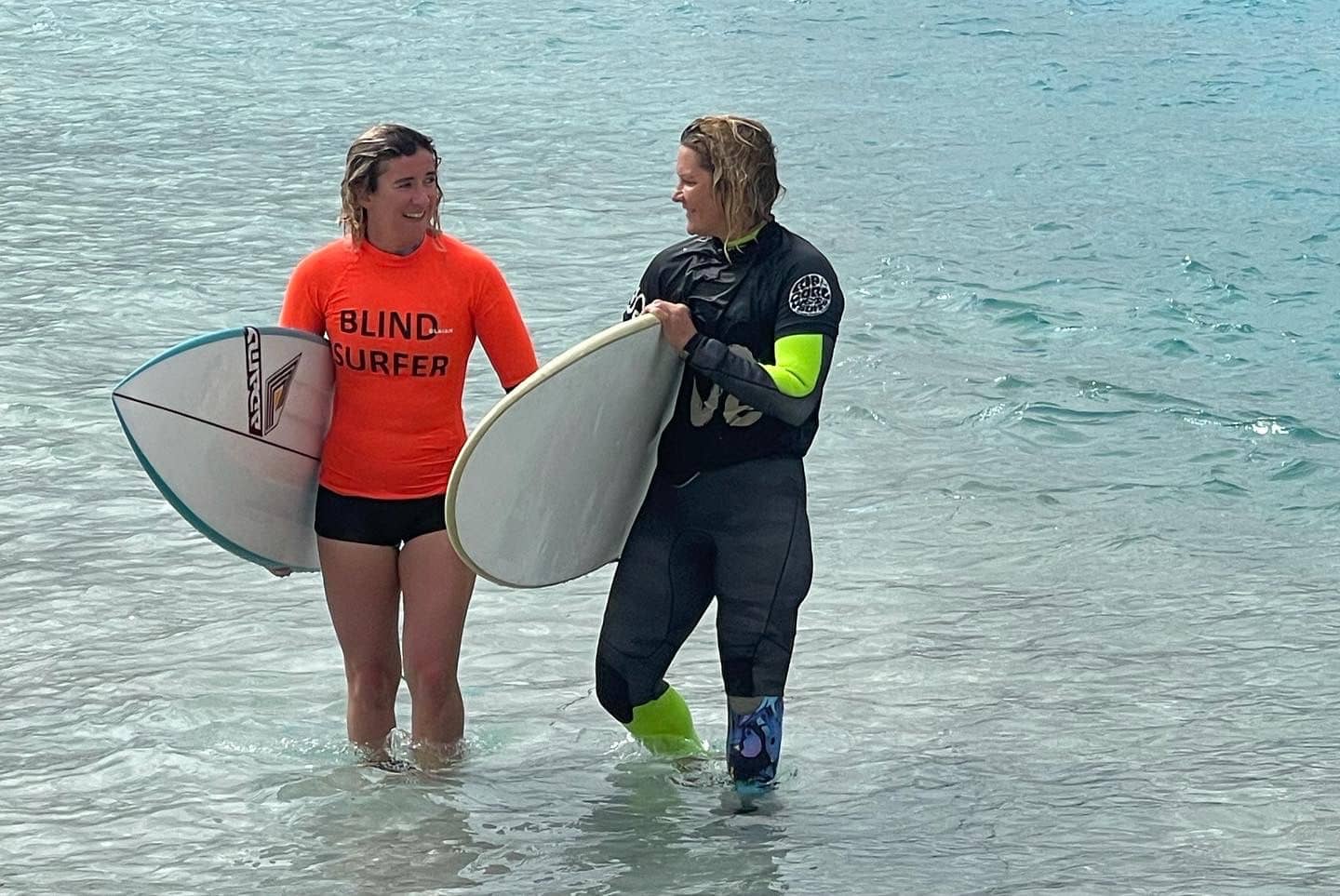
“So we went from spending a couple days at World Champions, [occasionally seeing each other], to spending 24/7 together. When it was our heat, we were sat in the water maybe 20 feet away from each other. Our friendship blossomed from that.”
Part of what makes the duo so close is the drive they share to progress in their sport. Equal parts friends and training partners, Reid and Smith provide for each other the support Surfing England lacks. “[They] say they are a grassroots organization,” explained Reid. “Which means as an elite athlete, you’re on your own.”
While it’s not the ideal situation, Reid and Smith know that if they want something done, they have to make it happen themselves. “Honestly, [knowing we had to do it ourselves] made it the perfect season,” smiled Reid. “Myself and Zoe, we’d gone to Morocco, we’d gone to Portugal. We were visiting each other every other week, and we were training. We’d sourced coaching, we’d sourced boards, and we went into the World Championships really happy and really confident in our abilities.”
At the World Para Championships both Smith and Reid placed second in their respective categories, Women’s Stand 2 and Visually Impaired 2. Though the women placed the same, they did not receive the same celebrations. “I’m actually super happy with my second place. The gap was much, much closer than last year,” said Reid. “But no one would come over and congratulate me because they thought I was disappointed. As opposed to Zoe, who came fourth the previous year. Everyone was ecstatic for her.”
It was the same mindset Reid encountered during her years as a triathlete, “if you’re not progressing, you’re failing”.
Reid expounded, “It’s a toxic level of achievement. Nobody can have a good day every single day. [Then in surfing] your whole performance outcome is deemed on twenty minutes of one day. Do people look at your growth throughout the season? How much you’ve improved your technical abilities, your physical abilities, and psychological abilities? The answer is no. Obviously everyone needs to improve and strive, that’s what makes a sports person good. But rather than [looking at second] in a negative way, saying [instead] ‘that was great. What can we do to support you in getting to your full potential?’”
Because the fact of the matter is, the gold medalist, Aleli Medina from Puerto Rico, has regular video analysis, with her coach out in the water as her eyes. It’s a level of resources to which Reid simply doesn’t have access. At an even more basic level, at the time of the interview, Reid had not been surfing since Worlds because without someone to drive her there, she has no way to get to the beach. “My only option is a taxi because I’m not allowed on public transport with my surfboards,” explained Reid. “Where I live, if I want to go surfing in a place which is more sheltered in winter, to go surfing for an hour would cost me anywhere between 120 and 180 pounds.”
Luckily Reid and Smith’s hard work last season paid off in more than just medals, as they both secured a sponsor and some funding for the next year. Reid is particularly excited because even during her triathlon days, she struggled to acquire sponsors since blindness was not conveniently apparent enough for marketing campaigns. Reid recalled a conversation where she was told, “‘Aesthetically, you’re not really what we’re looking for. It’s not really obvious enough for us.’ I’m like, what do you want me to do? Gouge my eyes out?”
Life has thrown plenty of challenges in Reid’s path and she has faced each with grit, grace, and just a touch of sass. When she’s not busy training, Reid shares her experiences and the lessons learnt through her work as a public speaker and coach. Reid explained, “the approach I take isn’t just from an elite background, working with disabled athletes for the last eleven years [has shown me] it’s about thinking outside the box. Not every person can learn the same way and I love that aspect about coaching.”
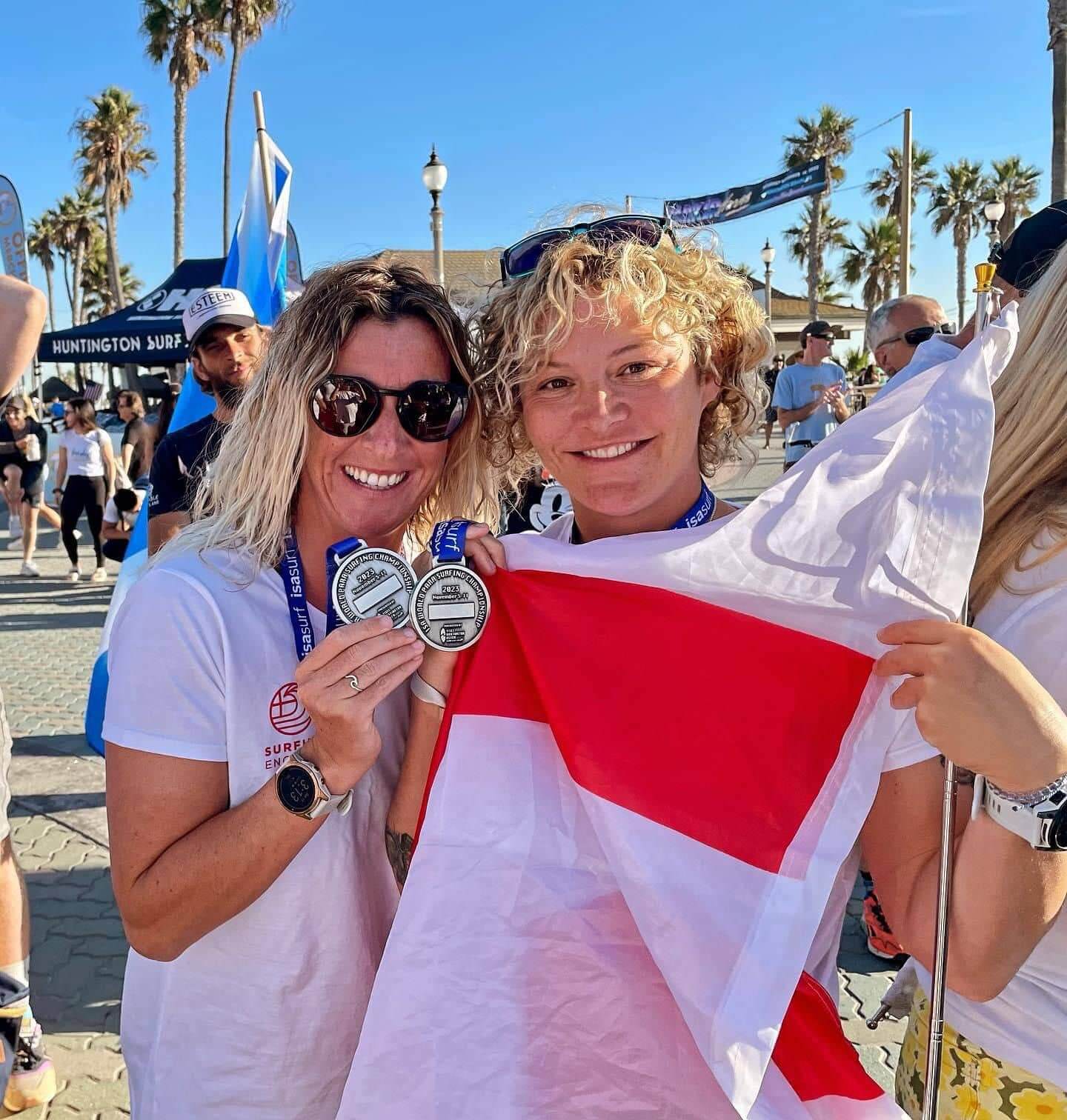
Looking at the future of adaptive surfing, Reid along with many others, is vying for surfing to be included in the 2028 Paralympics. “We all know for a fact, if it’s in the Paralympics, you get funding,” said Reid. “You get sponsors, and you’ve got that goal to strive for.” Currently the world of Para surf stands fairly united in their Paralympic goal and Reid would love to see the sport brought up to that elite level.
On the personal side, Reid’s goals moving forward include advocacy and progression. “[Zoe and I] want more women in surfing, more disabled women in surfing, especially more amputees, visually impaired, and blind people, because it’s not easy,” said Reid. “Then there’s lots of things I’d like to do. I’d like to get vertical turns. I’d like to be able to do an air. I’m really looking forward to spending the next couple years on some solid training. It’s a funny one. Everyone would assume that next year I’m going for gold, but actually the next two years I’m going to train.”
But perhaps the most exciting part of this push for training, is that Reid will get to spend more time in the water with her favorite “eyes”. “I’d have Zoe for every event if I could,” smiled Reid. “She knows exactly how I paddle. We work together to help and support each other. We’ve pushed each other’s surfing to the next level, and I think we’ll continue doing just that.”
